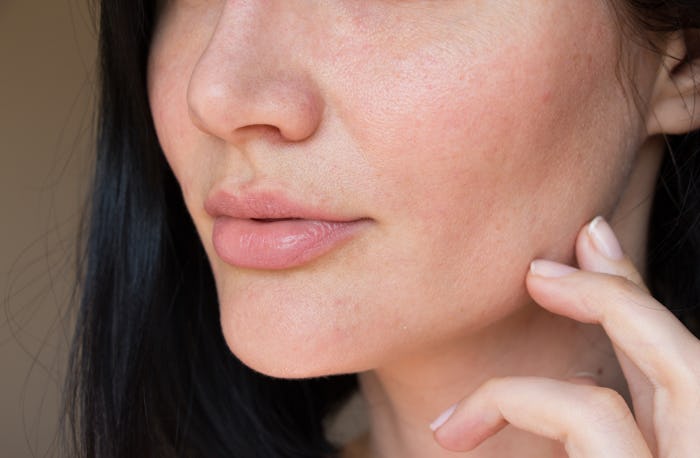For the most part, if you don't actively remove it, all women have facial and body hair, to some extent. The amount of facial and body hair that you have, however, can vary based on a number of factors. Though some women are embracing their facial and body hair or, at least, don't really concern themselves with it, others are quite perplexed with the amount that they have, dealing with bullies, anxiety, and more. There are some things that your upper-lip hair says about your health, or might say about your health, that can give you some important insight beyond just how you feel about it aesthetically.
Visible body and facial hair can be really distressing for some women who've been taught by society that they're not really supposed to have it (even though it's a totally natural thing to have). And when you feel a certain way about your facial and body hair based on how it looks, you may not even realize that there's more that your hair might be able to tell you about your health and your body. From what's going on in your body to your genes, diagnosable conditions, and more, there are some things that might explain your upper lip hair and other body hair that, if you have a lot of it, you may be interested in knowing more about.
1You're Taking A Certain Medication
If your upper lip hair has seemingly shown up (or gotten thicker or more noticeable) overnight and you've recently started taking a new medication, the two might actually be linked. As Healthline noted, certain medications, like those used to boost hair growth or suppress your immune system before an organ transplant can cause you to grow more hair along your upper lip.
2Your Hormone Levels Have Changed
Changing hormone levels, like what happens when you approach menopause, can also affect your facial hair. Fitness reported that the levels of estrogen in your body start to decrease in your 30s, when testosterone levels can cause the hair on your face to increase, while causing the hair on your head to decrease. So it might be unexpected, but completely normal — just a result of hormonal changes.
3It's A Mystery
Unfortunately, in some cases, there's no obvious cause for why you might have thick (or coarser) hair along your upper lip, as the aforementioned article from Healthline noted. If that's what you're dealing with, it might be more difficult for you to figure out a solution for it, if that's what you're hoping to do.
4You Have An Adrenal Disorder
Though it's not super likely, more hair on your upper lip might indicate that something is going on with your adrenal glands. MedlinePlus noted that a tumor or cancer affecting your adrenal glands or ovaries or another adrenal disorder might cause you to experience more or sudden hair on your upper lip.
5You've Always Had Higher Levels Of Androgens
Higher levels of androgens can cause body and facial hair to be thicker. While this kind of a thing can happen when your hormone levels change or you have a tumor that secretes testosterone, you also might have always had higher levels of androgens. In a response she wrote for the Telegraph, Dr. Giuseppina Del Bianco, a general practitioner, said that some women produce more androgens, which causes them to grow more facial and body hair, including along their upper lip.
6You're Dealing With PCOS
Polycystic ovarian syndrome can also cause increased body and facial hair. In an interview with pediatrician Dr. Jennifer Shu for CNN, Dr. Jennifer Gunter, an OB-GYN, said that PCOS is one of the most common causes of higher androgen production, which helps explain why many women with PCOS also have increased facial and body hair.
7It Says Nothing At All
Your facial and body hair — including the hair on your upper lip — might not actually mean all that much at all. In the aforementioned article from the Telegraph, Del Bianco noted that in addition to the women who produce more androgens, there are also some women that have more upper lip hair due to genetics or whose hair follicles are more sensitive to androgens, which also encourages more hair growth. In these cases, your upper lip hair might just be the way your body or genetics are. If you're not OK with your upper lip hair, you can try different techniques to remove it, but if it doesn't bother you all that much, you can rest easy, knowing that it's probably no big deal.
Still, if you have a lot of upper lip hair, talking to your doctor can be a good idea so that they can look into things more carefully and make sure that there's no medical treatment needed.
